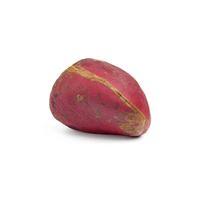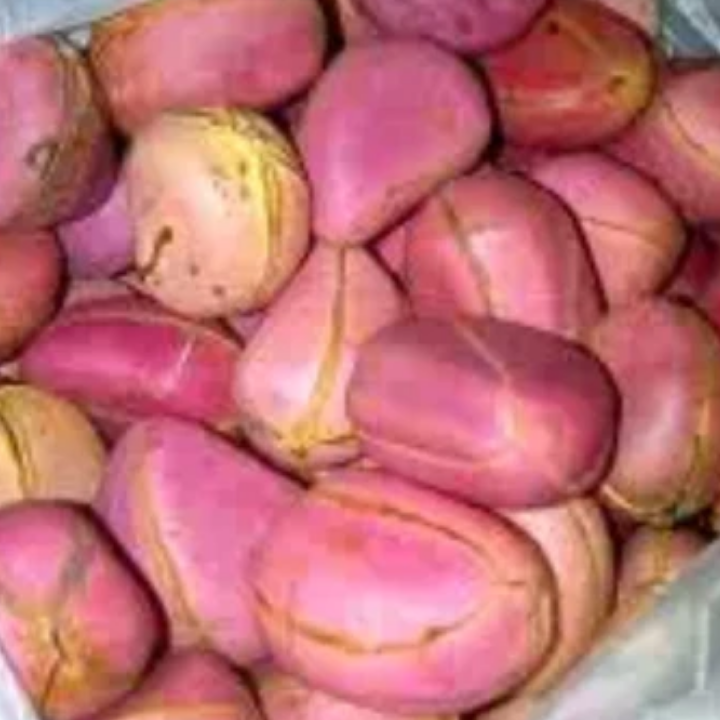angelicpurenaturalproducts
Kola Nut (Oji Igbo)
Couldn't load pickup availability
The Significance of Kola Nut (Oji) in Igbo Culture
The kola nut is the seed found within the fruit of the evergreen kola tree, which thrives in the rainforests of West Africa. Enclosed in white shells and contained within the star-shaped fruits of the tree, the kola nut holds deep cultural and spiritual significance, particularly among many ethnic groups in Nigeria.
In Igbo culture, the kola nut—locally referred to as Oji—is a symbol of unity, respect, and hospitality. It is an essential part of various traditional ceremonies, including weddings, naming ceremonies, funerals, initiation rites, oath-taking, and other cultural rituals. It is always presented to guests as a token of welcome, often alongside traditional drinks such as palm wine.
There are two primary types of kola nuts commonly recognized in Nigeria:
Oji Igbo (Igbo kola nut)
Oji Hausa (Kworo)
However, we specialize exclusively in the Oji Igbo variety.
---
The Role of Oji in Igbo Society
The kola nut is not sweet to chew, but its value lies far beyond its taste. In the Igbo tradition, it plays a central role in nearly every social gathering and ceremony. It is often the first item presented to visitors after exchanging greetings, symbolizing warmth, peace, and acceptance.
In situations where a kola nut is unavailable, hosts may say phrases such as:
"Akọna m ọnụ ọjị" – I have no kola nut.
"Ka m jide gị ụgwọ ọjị" – Let me owe you kola nut.
"Ọjị juru ụlọ" – The house is full of kola nuts.
"Abalị atala ọjị" – Night has fallen on the kola nut (meaning the visitor arrived too late for it).
In Igbo culture, there is no substitute for the kola nut.
---
Traditional Protocols and Taboos Associated with Oji
The breaking of the kola nut is a revered tradition with numerous customs and protocols, including:
Women are not permitted to climb the iroko tree (osisi oji) from which the kola nut is harvested—it is considered taboo.
While stealing other items may attract punishment, stealing kola nut is regarded as a grave abomination.
Only men, whether young or old, may break kola nuts. However, individuals who have committed sacrilegious acts (ihe ala na-asọ nsọ) are forbidden from doing so. This is encapsulated in the Igbo proverb:
"Ọjị bụ nwa Amadị, aka rụrụ arụ anaghị aga ya n'ihu."
(Kola nut is a child of the gods; unclean hands must not touch it.)
A man must not break kola nut in his in-laws’ house—it is a sign of disrespect.
An elder must always be given the honor of breaking the kola nut in a gathering. If a younger man is to break it, he must be delegated by the elders.
Traditions Regarding Women and the Kola Nut
A woman is not permitted to break the kola nut in the presence of men, nor is she allowed to offer prayers with it (iji ya gọọ ọfọ).
While a woman may present the kola nut, she cannot break it—unless she is a traditional spiritualist or native doctor. In such cases, she may break and consume the kola nut privately, often as part of a ritual with her spiritual entities. However, she must still present a separate kola nut to the male participants, who will then break it themselves.
---
TYPES OF IGBO KOLA NUTS
A kolanut without any partitions (nke gbara naanị otu ibe or nke gbaghị ibe ọbụla) is referred to as a blind kolanut (ọjị isi). This type of kolanut is regarded as a bad omen—it is rejected by both humans and spirits and is immediately discarded when discovered.
The ọjị ikenga or ọjị dike (meaning mighty kolanut) typically has three lobes (partitions). It symbolizes wholeness and completeness and is believed to bring good fortune.
Kola nuts with four, five, or six partitions also hold symbolic meanings:
The four-lobed kolanut represents the four Igbo market days: Eke, Orie, Afọ, and Nkwọ, and is considered a good omen.
Five- and six-lobed kola nuts are symbolic of wealth and prosperity. It is commonly believed that whoever breaks such kola nuts will experience incoming fortune.
---
CEREMONIAL AND SPIRITUAL USES OF THE KOLA NUT
In Igbo tradition, the kola nut plays a significant role in ceremonies, rites, and rituals. It serves both spiritual and communal functions. Key uses include:
Consultation with spirits and communication with the spiritual realm.
Entering covenants to solidify relationships, partnerships, or agreements.
Intercession or pleading, either on one's own behalf or for someone else.
Marriage proposals—the man must send kola nuts to the family of the woman he intends to marry, formally declaring his intention.
Prayer rituals (ịgọ ọfọ), particularly during naming ceremonies, where elders use the kola nut to pray to Chukwu Okike (The Almighty God).
Welcoming visitors as a gesture of hospitality.
Divination and sacrificial offerings to deities or ancestral spirits.
Celebrations and rites, such as traditional and white weddings, coronations, naming ceremonies, and burials.
---
Medicinal and Health Benefits of the Kola Nut
The kola nut has been used in traditional West African medicine for centuries. It is valued not only for its cultural significance but also for its health benefits, which include:
Boosting the body’s metabolism
Enhancing mental alertness and cognitive sharpness
Increasing energy levels
Improving sexual performance
Clearing the throat and aiding respiratory function
Stimulating an increase in heart rate, which contributes to increased blood flow and energy
Materials
Materials
Shipping & Returns
Shipping & Returns
Dimensions
Dimensions
Care Instructions
Care Instructions


Image with text
Pair text with an image to focus on your chosen product, collection, or blog post. Add details on availability, style, or even provide a review.
-
Free Shipping
Pair text with an image to focus on your chosen product, collection, or blog post. Add details on availability, style, or even provide a review.
-
Hassle-Free Exchanges
Pair text with an image to focus on your chosen product, collection, or blog post. Add details on availability, style, or even provide a review.


